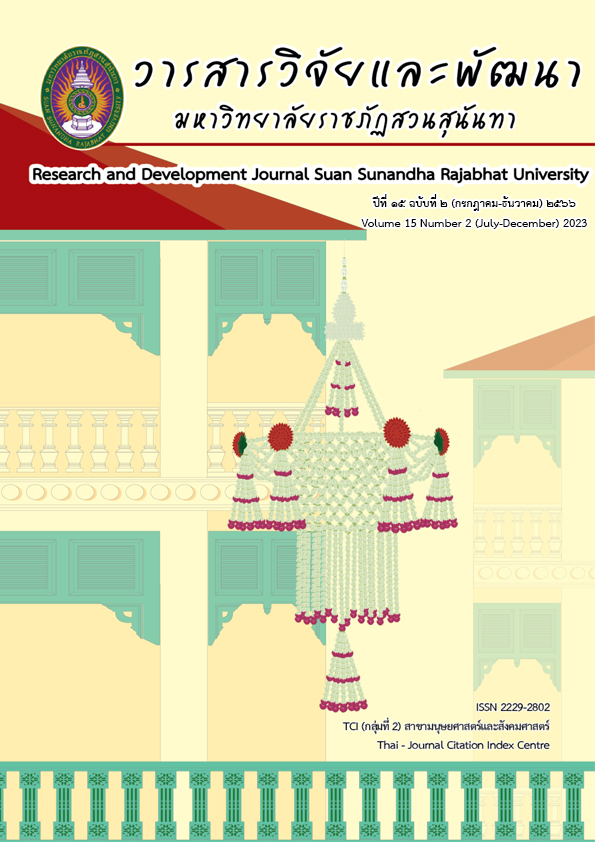การใช้เทคโนโลยีดิจิทัลในการปฏิบัติงานทางวิทยาศาสตร์ของนักเรียน
คำสำคัญ:
เทคโนโลยีดิจิทัล, การปฏิบัติงานทางวิทยาศาสตร์, นักเรียนบทคัดย่อ
เทคโนโลยีดิจิทัล เป็นเครื่องมือสนับสนุนในการปฏิบัติงาน และสนับสนุนการเรียนรู้ของนักเรียนให้การเรียนรู้มีประสิทธิภาพมากขึ้น ในการจัดการเรียนการสอนวิทยาศาสตร์ในปัจจุบัน นักเรียนต้องได้เรียนรู้ผ่านการปฏิบัติงานทางวิทยาศาสตร์ ซึ่งเป็นแนวปฏิบัติหลักที่นักวิทยาศาสตร์ใช้ในการสำรวจ สร้างแบบจำลอง และสร้างทฤษฎีเกี่ยวกับโลก ด้วยการส่งเสริมให้นักเรียนได้ปฏิบัติด้วยตนเอง ไม่เพียงเรียนรู้จากผู้อื่น ครูผู้สอนจึงมีหน้าที่ในการจัดสภาพแวดล้อมและส่งเสริมให้นักเรียนใช้เทคโนโลยีดิจิทัล เครื่องมือสื่อสาร และเครือข่ายสังคมออนไลน์ในการเข้าถึง การจัดการ การบูรณาการ การประเมิน และการสร้าง ในการปฏิบัติงานทางวิทยาศาสตร์ เพื่อให้นักเรียนได้สื่อสาร เรียนรู้ ทำงาน และแก้ปัญหาร่วมกันได้อย่างมีประสิทธิภาพ อันจะนำไปสู่การเรียนรู้วิทยาศาสตร์ในยุคดิจิทัล โดยครูผู้สอนต้องออกแบบการเรียนรู้ที่ส่งเสริมให้นักเรียนมีความเข้าใจ และใช้เทคโนโลยีที่เหมาะสมกับการเรียนรู้
เอกสารอ้างอิง
Budsub, D., & Thoochudee, M. (2017). USING GEOGEBRA TO ORGANIZE 4MAT LEARNING ACTIVITIES TO IMPROVE THE LEARNING ACHIEVEMENT IN HYPOTHESIS TESTING. Rangsit Graduate Research Conference, 12, pp. 1595-1604.
Chamrat, S. (2019). Technology Integrated Science Learning. Walailak Journal of Learning Innovations, 5(1), 39-64 (In Thai).
ChanLin, L. J. (2008). Technology integration applied to project‐based learning inscience. Innovations in Education and Teaching International, 45(1), 55-65. doi:10.1080/ 14703290701757450
Compaine, M. B. (2001). The Digital Divide: Facing a Crisis or Creating a Myth? . Cambridge: Mass: MIT Press.
Echazarra, A. (2018). "How has Internet use changed between 2012 and 2015?". Paris: PISA in Focus, No. 83, OECD Publishing. doi:10.1787/1e912a10-en
ICT Literacy Panel. (2002). Digital Transformation: A Framework for ICT Literacy. A Report of the International ICT Literacy Panel, Educational Testing Service.
Ministry of Education. (2017). Indicators and Core Curriculum Science learning subject group, (Revised Edition B.E. 2560). In Core Curriculum of Basic Education B.E. Agricultural Cooperatives of Thailand Limited.
National Academy of Sciences. (2012). A FRAMEWORK FOR K-12 SCIENCE EDUCATION Practices, Crosscutting Concepts, and Core Ideas. Washington, DC: The National Academies Press.
Nuengchalerm, P. (2015). Science Learning in the 21st Century. Bangkok: Chulalongkorn University Press (In Thai).
OECD. (2015). Students, Computers and Learning: Making the Connection. PISA: OECD Publishing, Paris. doi:10.1787/9789264239555-en
Partnership for 21st Century Skill. (2019). Framework for 21st Century Learning. Retrieved September 10, 2022, from https://static.battelleforkids.org/documents/p21/P21_ Framework_DefinitionsBFK.pdf
Poutintsev, F. (2021). What Is Digital Technology? 25 Best Examples. Retrieved September 10, 2022, from https://honestproscons.com/what-is-digital-technology-25-best-examples/
Saksuparb, K. (2019). Using Kahoot to Ask Questions in Science. Journal of Education Burapha University, 29(2), 1-11 (In Thai).
Shatri, Z. G. (2020). Advantages and disadvantages of using information technology in learning process of students. Journal of Turkish Science Education, 17(3), 420-428.
State Government of Victoria. (2019). Teach with digital technologies. Retrieved September 10, 2022, from https://www.education.vic.gov.au/school/teachers/teachingresources /digital/Pages/teach.aspx
Sungkawadee, R., & Keawurai, R. (2017). The development of e–learning courseware integrated with activities on facebook in the ways of living in the digital age course: The ethics of living in the digital era of living for bachelor degree students, Naresuan University. Journal of Education Naresuan University, 19(3), 133-146 (In Thai).
Suradsrong, K., & Kijkuakul, S. (2020). MODEL-BASED LEARNING APPROACH INTEGRATED WITH AUGMENTED REALITY FOR ENHANCING GRADE 10 STUDENTS’MODEL-BUILDING SKILLS AND SCIENTIFIC CONCEPTIONS. Journal of Education Naresuan University, 23(4), 46-57.
University of Colorado Boulder. (n.d.). PhET: Interactive Simulations for Science and Math. Retrieved February 2, 2022, from PhE TInteractive Simulations: https://phet.colorado. edu/
ดาวน์โหลด
เผยแพร่แล้ว
รูปแบบการอ้างอิง
ฉบับ
ประเภทบทความ
สัญญาอนุญาต
ลิขสิทธิ์ (c) 2023 มหาวิทยาลัยราชภัฏสวนสุนันทา

อนุญาตภายใต้เงื่อนไข Creative Commons Attribution-NonCommercial-NoDerivatives 4.0 International License.
บทความที่ได้รับการตีพิมพ์เป็นลิขสิทธิ์ของ สถาบันวิจัยและพัฒนา มหาวิทยาลัยราชภัฎสวนสุนันทา
ข้อความที่ปรากฏในบทความแต่ละเรื่องในวารสารวิชาการเล่มนี้เป็นความคิดเห็นส่วนตัวของผู้เขียนแต่ละท่านไม่เกี่ยวข้องกับมหาวิทยาลัยราชภัฎสวนสุนันทา และคณาจารย์ท่านอื่นๆในมหาวิทยาลัยฯ แต่อย่างใด ความรับผิดชอบองค์ประกอบทั้งหมดของบทความแต่ละเรื่องเป็นของผู้เขียนแต่ละท่าน หากมีความผิดพลาดใดๆ ผู้เขียนแต่ละท่านจะรับผิดชอบบทความของตนเองแต่ผู้เดียว





